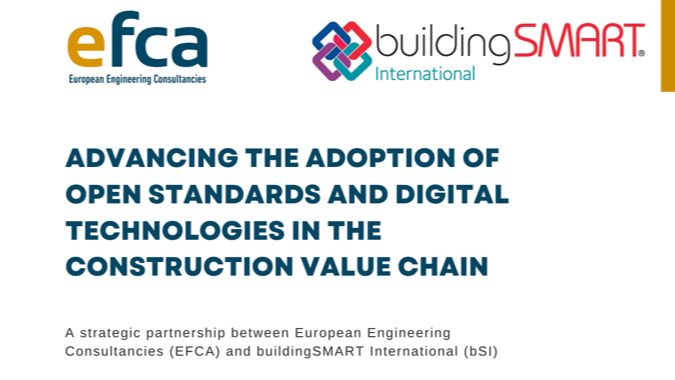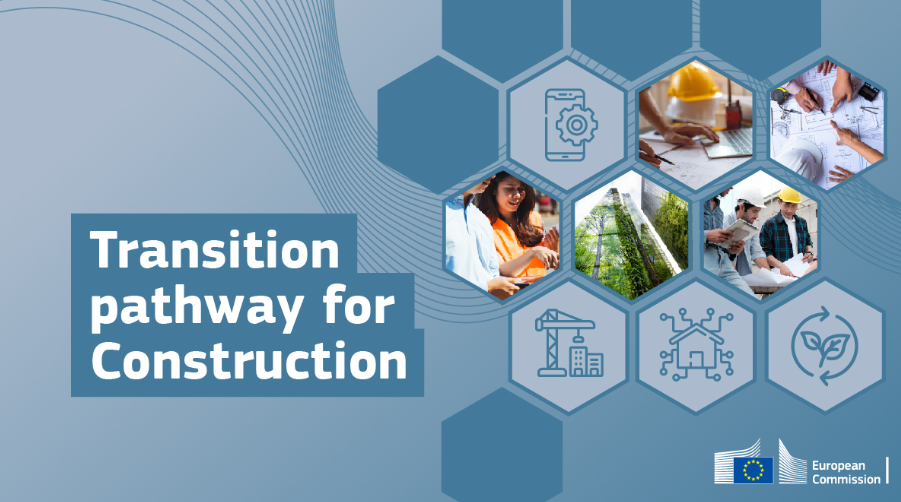EFCA Newsletter 29 June< back to news


Advancing the adoption of open standards and digital technologies in construction
We are thrilled to announce the strategic partnership between European Engineering Consultancies and buildingSMART International. Together we want to promote the adoption of open standards and digital technologies in the construction industry. In spite of the growing use of BIM, we still need full interoperability and standardised work practices. Open standards provide a framework for seamless integration and collaboration, fostering efficiency and innovation. EFCA brings industry expertise and a vast network of professionals, while bSI's global presence and experience in developing open standards has long supported the transformation of the design and construction process. Together, we will work for the industry's efficiency, effectiveness, and sustainability.
Through this partnership, EFCA and bSI will develop guidelines and push for a more connected, digitally advanced construction ecosystem. More information is available here.

Supporting the Transition Pathway: EFCA's commitments
Following the publication of the Transition Pathway for Construction by the European Commission's Directorate-General for Internal Market, Industry, Entrepreneurship and SMEs (DG GROW) earlier this year, EFCA has presented its commitments in response to this document. Concrete actions taken by EFCA involve strengthening partnerships and cooperation with stakeholders such as industry associations, research institutes, policymakers, and other key participants in the construction value chain to enhance the promotion of skills and talent in the sector. Additionally, EFCA is interested in exploring the development of Level(s) for infrastructure and supports the creation of Digital Building Logbooks, which will improve access to vital information and efficiency.

EFCA responds to consultation on external financing instruments
EFCA has submitted its response to the EU's public consultation on the Evaluation of the EU's External Financing Instruments for the 2014-2020 and 2021-2027 financial frameworks. EFCA's preliminary analysis highlights both positive and challenging aspects of the new financing instrument. While the new partnership instrument has increased cooperation with partner countries, accessing EU funds has become more complicated for the European engineering industry, particularly for SMEs. The absence of dialogue with EU Delegation staff and the introduction of new procurement criteria have deterred European engineering firms from engaging in EU external aid tenders. Additionally, the shift towards budget support mechanisms and delegated management has reduced the visibility of EU external cooperation. The consolidation of separate instruments into the NDICI-GE has led to fewer service contract tenders from the European Commission, affecting the activity level of the European consulting industry.
EFCA welcomes the European Commission's evaluation of the external financing instrument but urges an assessment of its impact on the European consulting industry. Ongoing dialogue and addressing these challenges will be vital for optimising the instrument's potential and supporting a thriving consulting industry in Europe. More information is available here.

EFCA Green Deal Committee Discusses Taxonomy
During the meeting of the Green Deal Committee earlier this week, members exchanged views on the latest developments in taxonomy and its implications for the consulting engineering field. To help us better understand the subject, we were delighted to hear from Philippe Moseley (DG GROW) and Pekka Vuorinen (Finnish Association of Construction Product Industries), whose contributions really informed our discussions. Given the European Union's ambitious sustainability objectives, the taxonomy assumes a vital role in facilitating the transition towards a more sustainable economy. The focal points of the discussion included the challenges and opportunities that arise from aligning with the taxonomy's criteria and standards. Given that engineers will be responsible for performing the calculations for taxonomy reporting, it is crucial for our members to actively engage in these discussions and ensure that the criteria are workable. EFCA remains fully committed to actively collaborating with policymakers and industry stakeholders to ensure that the implementation of the taxonomy solves the problems it aims at solving. EFCA is also advocating for a taxonomy that is equitable, inclusive, and supportive of the industry's transition towards sustainability.


